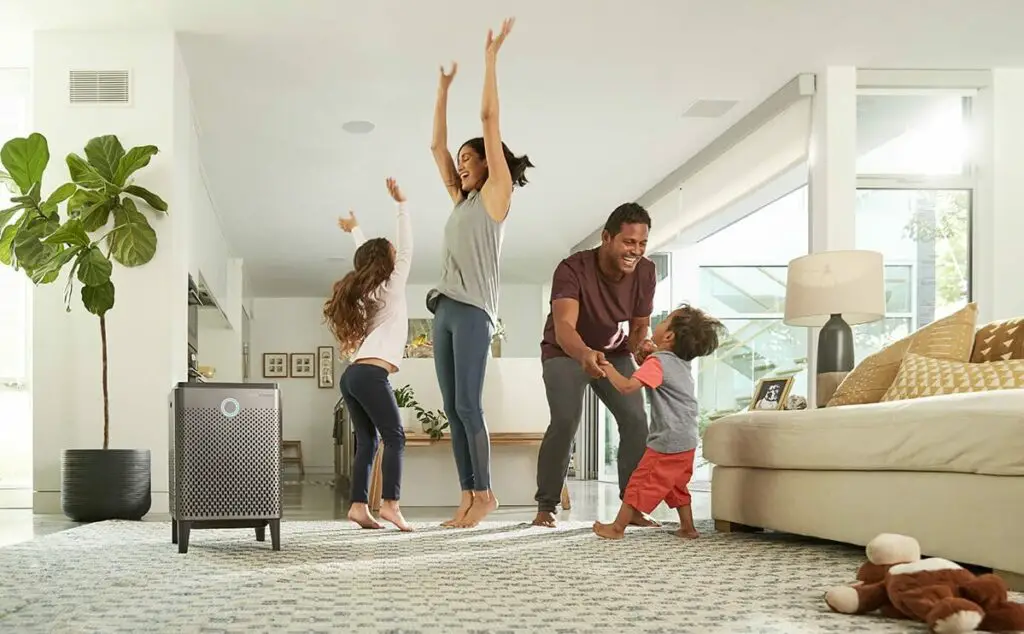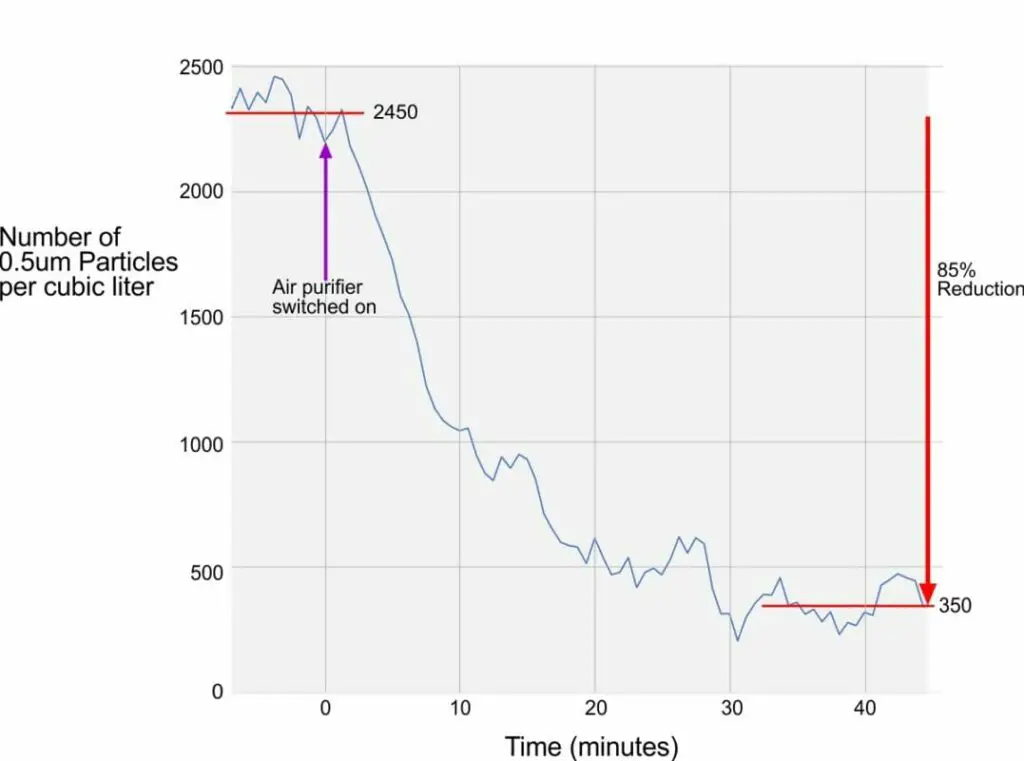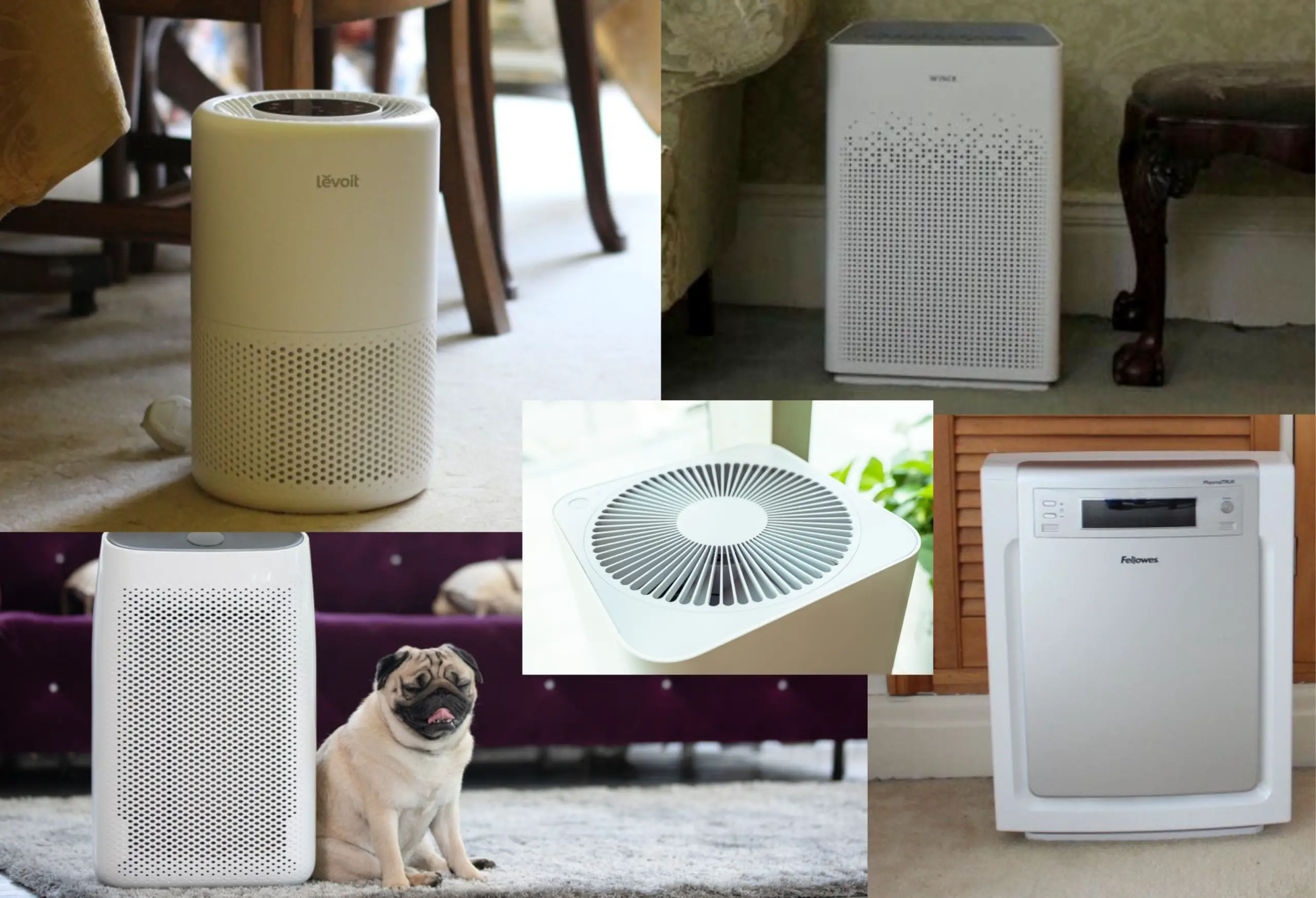Particle pollution is very strongly linked to health outcomes and is the 9th most common cause of death in the U.S. Forest fires are a particular problem in the western U.S. and the burning of fossil fuels in the eastern U.S. The smoke from both contains chemicals but also fine and ultrafine airborne particles. In these areas air purification is a necessity, but how many air purifiers do you need?
The guiding principle is that everyone in the house should be able to breathe purified air 24/7.
As a general rule, you will need a true HEPA air purifier for each occupied bedroom and at least one for the living area/kitchen. It is usually not practical to purify the air in every room. Whilst HVAC system filtration can be upgraded, it will not usually give the same degree of air purification.
The Number of Air Purifiers Needed is Governed By The Health Benefits
If the reason for having an air purifier was just to make the room smell nice then maybe all your home would need would be an air purifier with a large activated carbon filter in one part of the home to reduce the odor.
However, as the reason is to improve your indoor air quality to such an extent that it helps preserve health then multiple air purifiers are needed to supply everyone in the home with purified air 24/7.
However the situation is not as simple as this as airborne particles have serious adverse health effects-
Airborne particles have been shown in clinical or epidemiological studies, often multiple studies, to cause-
- Coronary heart disease-heart attacks
- Strokes
- Premature aging of the lungs
- Chronic obstructive pulmonary disease
- Pneumonia
- Cancer
- Lymphoma
- Diabetes
- Skin problems including skin aging
- Autoimmunity
- Osteoporosis
- Diabetes
- Kidney disease
- Dermentia
- Cognitive decline-decrease in thinking ability
- Parkinson’s disease
- Vision impairment-age related macular degeneration and glaucoma
- Impairment of sense of smell
- Sleep disturbance
- Depression
- Anxiety
- Increased risk of psychiatric problems
- Decrease in fertility
- Increased miscarriage
- Exposure during pregnancy linked to neurological problems, asthma, lower IQ in child
- Children-lower intelligence and delayed psychomotor development, faster decline in cognitive function in adulthood
- Children-chest infection, asthma
- Children-increased obesity
- Children-increased psychiatric problems
- Children-death rate increased
- Premature aging?-ultrafine particles speed up several processes involve in aging
- Premature death
The fine particles irritate the airways and the ultrafine particles can enter the bloodstream where they may even speed up aging, as outlined in this article. There is evidence that we are happier, healthier, and more intelligent if we do not breathe in airborne particles.
So there is an argument for everyone especially the elderly having air purification.
How Many Air Purifiers do I Need for My Home?
To purify the air in the parts of your home where you will be
On the whole, you will need one air purifier per occupied bedroom and one for every other room that is used for more than 60 minutes during the day. So for a couple they may need 3, one for the bedroom, one for the kitchen and one for a home office.
Room size also matters, if an open plan kitchen/living area is very large it may need 2 air purifiers just for the one room.
To purify the air in the whole of your home
To purify the air in the whole home for many people will be difficult, but may be practical if you have a small home. The largest area an air purifier can serve and meet EPA guidance of a particle reduction of 80% or more at a noise level of 51db or below is 642 sq ft. This is achieved by the Coway 400S, please see illustration below.
You will see claims in reviews for other air purifiers having greater areas of coverage than this. These claims either involve calculations for fewer air changes per hour, when EPA minimum standards would not be met or when the air purifier fan speed is so high and the noise so great that you would not be able to live with the air cleaner on that setting.
Other than the size, the layout of the home will affect air purification. For instance, if the only air purifier in a small home is in the main living area then because air currents will tend to circulate in the main living area the air purification will tend to be very good in this area. The bedroom or bathroom air will not be part of these currents, sure there will be diffusion of purified air through the doors and into the rooms. However, this will not be as effective as the air being part of the circulating air currents in the main room.

How Many Hours Should I Run an Air Purifier?-timing of air purification does affect the number of air purifiers that you need
On the whole, you should run your air purifier for at least 30 minutes before you step into the room and during the whole time that you are in the room. This is because an air purifier takes 30-45 minutes to fully lower the particle count, as seen in this graph from an experiment that I did-

This increases the number of air purifiers that you need as it means that simply moving an air purifier with you where ever you go will not work well. This is because, for the first 30 minutes after a move into another room, the air will not be adequately purified. So ideally you will need at least 2 air purifiers. If you change rooms frequently, this could add up to several hours per day of breathing unpurified air.
Do I Need an Air Purifier in Every Room?
As a general rule, you do not need an air purifier in every room, only those that you will spend more than an hour in each day. Then you can program the air purifier in the room to come on 30 minutes before you step into the room. This means that if you have one room that you spend 55 minutes in each day and do not have an air purifier in, you will only be breathing unpurified air for an additional 4% of the day. For most people, this would be a reasonable tradeoff for not having an additional air purifier.
However, if you or a member of your family have a medical condition such as asthma or cardiovascular disease, you may indeed wish to have an air purifier in every room that you or they go in everyday. Even if you do not have a medical condition, you may still wish to have an air purifier for every room that you spend a certain amount of time in. You may decide that for you that the time limit will be less than an hour eg 20 minutes.
How Can I Calculate if I Need More Air Purifers?
On the whole, you can calculate how many air purifiers you will need by analysing how the people in your home use the rooms. If anyone spends longer than an hour in a room, the room probably should have an air purifier. You may wish to vary this time to be a longer or shorter period. If the person is vulnerable, eg with asthma or elderly with cardiovascular disease you may decide that it is enough that if they spend any time in a particular room, it needs an air purifier.
For individual rooms you can calculate if you need additional air purifiers by measuring the air quality before the air purifier is turned on and then again after it has been on for 45 minutes and see if there is the EPA recommended minimum particle reduction of 80%.
Can I Use Multiple Air Purifiers in a Room?
It is fine to use more than one air purifier in as room. In fact if you have a very large room that needs air purification, you may need 2 air purifiers as one will not be enough. They will each supply a certain clean air delivery rate (CADR) which is the amount of clean air that is supplied per unit time. You can add the CADR of the multiple air purifiers together to see if this is adequate for your room size.
Actually, the net effect of 2 air purifiers in one room may be greater than simply adding them together because of the currents of air flow in the room. For instance, if you have one air purifier in a large room, the air near the air purifier may be very clean but that at the opposite end of the room not so clean. By putting another air purifier at the other end of the room you would then clean the air at that end more than simply buying a larger air purifier.
The Most Important Rule in Air Purification May Cause You to Buy Additional Air Purifiers
As we cannot sense airborne particles unless the contamination is gross as in smoke, and as your health depends on it the most important rule of using an air cleaner is that you should check that it reduces particle count or PM2.5 by the EPA’s minimum standard of 80%. To do this you will need an air quality meter which may measure particle count or PM2.5. You can find an article about these, including some very cheap ones here.
I can almost guarantee that unfortunately if more homes actually tested their air quality with a meter probably more than 75% would realize that they were currently not hitting the target!
Of course if the particle count is not reduced adequately you may need to buy an additional air purifier.
Can I Use My HVAC System as a Whole Home Air Purifier to Reduce the Number of Air Purifiers That I Need to Buy?
As a general rule, you can use your HVAC system to improve the quality of your indoor air. Simple modifications, such as increasing the quality of the HVAC filter to MERV13, will help and it may be possible with more extensive remodelling of the system to even use a MERV16 filter which is close to HEPA standard. You will need to run the HVAC system 24/7, usually HVAC systems only run for part of the time to regulate the temperature and/or humidity.
Increasing the quality of the HVAC filter will cause more obstruction to airflow and so you should check with an HVAC engineer that your system will cope, this would also be a good opportunity to discuss taking the filter specification up to MERV16 standard.
There is a helpful article “how to use your HVAC system as a whole home air purifier” that explains this in more detail. As upgrading the filter in your HVAC system may be a very easy and cheap swop, you should explore this avenue when you buy an air purifier as an additional measure to improve air quality in your home.
So upgrading your HVAC filter/system is a great thing to do, but it will not clean your air as well as an air purifier unless you go for a really monstrous upgrade. So it will not really reduce how many air purifiers you will need to buy.. If you have children, you really should upgrade the HVAC system as they are unlikely to stay conveniently in areas with air purifiers. They are likely to play throughout the house.
How to Buy and Use the Many Air Purifiers That You Will Need
In one review of studies where air purifiers were used, fine particulate matter was reduced between 23-92%. Bear in mind the EPA recommends a minimum reduction of 80%. So even in experimental studies with training in how to use the air purifiers, most air purifier users failed to hit this target. On the other hand, it shows that air purifiers, when used well, can decrease particle count by 90%. This just emphasizes the importance of how you use the air purifier.
- Buying an air purifier-the air purifier should have a true HEPA filter, adequate air flow (CADR) at a noise that you can tolerate for long periods. The air purifier should be “smart” that is programmable or capable of being made smart. The most difficult part is buying one with an adequate air flow at a noise that you can tolerate for long periods as most air purifiers are too loud on their maximum fan speed and manufacturers usually do not give data on air flow and noise at lower fan speeds. There is helpful advice about buying an air purifier here-“Buying an air purifier”. Alternatively, just buy the recommendations on this site. If you want the quietest air purifier you may wish to read this article-“Best Quiet Air Purifiers“, if you need one that will remove particles very well but is particularly good at removing chemicals from the air, for example from forest fires, please see this article-“Best Air Purifier for Smoke“.
- Position the air purifier at least 12 inches from any wall-so that the air coming out of the air purifier joins in with the circulation of air in the room. There is advice about using an air purifier in this article-“How to Use an Air Purifier“.
- Run the air purifier for at least 30 minutes before entering the room. This is because it takes an air purifier this long to reduce the particle count in the room. So the air purifier that you buy needs to be smart or capable of being made smart by plugging it into a smart plug.
- Run the air purifier continuously when you are in the room at the highest setting that you can tolerate long term. This is because the higher the setting that you run the air purifier on the lower the particle count in the air will be. There is no lower threshold known below which human health does not improve, so the lower the particle count/PM2.5 the better. Health aspects of particle count/PM2.5 are outlined in this article-“Airborne Particles and Chemicals Affect Us All Now“.
- Never run the air purifier using its inbuilt sensor-there are 7 reasons that you should not do this as outlined in this article-“How to Use an Air Purifier“.
- Always test the air with an air quality meter where you are going to sit at the height in the room where your mouth and nose are. Comparing the measurements before and 45 minutes after switching the air purifier on there should be at least an 80% reduction in particle count as the EPA recommends. Testing that the particle count/PM2.5 is adequately reduced by your air purifier is the most important thing that you need to do. Air quality meters can be brought really quite cheaply eg $35, there is a helpful article about them here-“How to Test Air Quality in Your Home“.
- How many air purifiers do I need?-at least 2 but maybe 5 or more. Please see this article “How many air purifiers“.
Conclusion
You are likely to need a minimum of 2 air purifiers, one for a bedroom and one for an area that you will be in the daytime. A couple will probably need 3 air purifiers, one for their bedroom and one for each of two daytime areas. A family of 4 is likely to need 5 air purifiers, 3 for bedrooms and 2 for daytime areas.
Related Questions
Related Articles
Is An Air Purifiers Good for You? 3 medical studies decide
Water Air Purifier-3 scientific tests may surprise you
How to Clean an Air Purifier (Complete Guide)-never do this!

